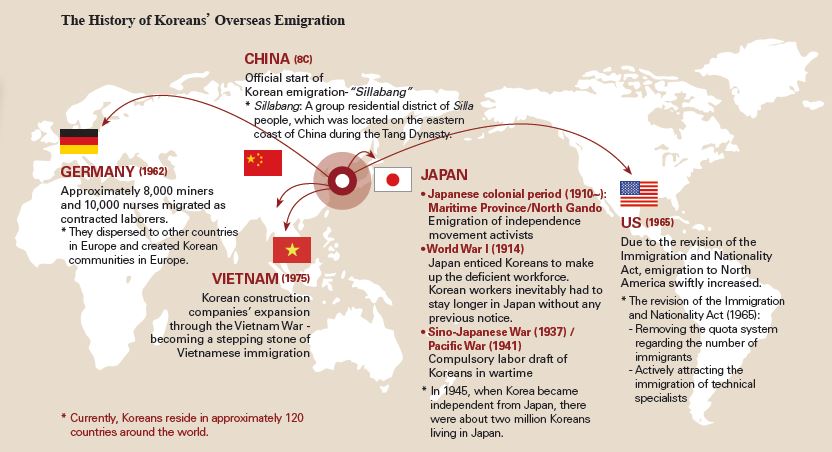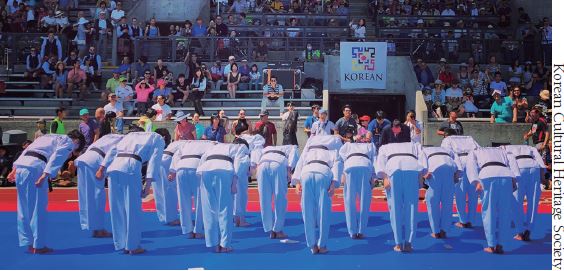The Korean Peninsula is the home of 74 million Koreans. Outside of the peninsula, however, seven million Koreans also exist. Celebrating the upcoming Korean Day on October 5th, it would be meaningful to have an opportunity to find out how these Koreans are living. Therefore, the Sungkyun Times (SKT), covers the past and present condition of overseas Koreans, some of the difficulties they have experienced, and the positive effects they may bring about as Koreans.
Overseas Koreans and Their History
The Number of Koreans Abroad
It is not only the Korean Peninsula where you find Koreans, of course, as there are millions of Koreans living all over the world. These are people that we refer to as “Overseas Koreans”. According to the report of the current status of overseas Koreans in 2017 of the Ministry of Foreign Affairs (MOFA), 7.4 million Koreans reside outside of the Korean Peninsula. These overseas Koreans generally can be divided into two categories: Korean nationals who are residing abroad and Koreans who have foreign nationality.
Koreans with foreign nationality are usually people who once had Korean nationality but acquired foreign nationality later, including their lineal descendants with foreign nationality. Those overseas Koreans have inhabited a variety of countries. When looking at the order of the regions where most overseas Koreans are living, the largest number, estimated at around 3.4 million, lives in Northeast Asia, including China and Japan. This is followed by North America with 2.7 million Korean residents, Europe with 630,000, and South Asia and the Pacific area with 550,000. One third of the entire population of overseas Koreans, which is approximately 2.4 million, has Korean nationality.

Difficulties for Overseas Koreans
Sociocultural Discrimination
Discrimination against overseas Koreans has been a continual issue in many areas, including education and employment, since the early days of Korean emigration. In 1937, by actions of Stalin, the dictator of the Soviet Union, to prevent the invasion of Japan, Koreans in the Maritime province (Koryosaram) compulsorily emigrated because they were considered to have a possible connection with Japan. They travelled by train and arrived in Kazakhstan and then, all dispersed. Koreans made their shelter in the stable of desert regions or in pigsties and did manual labor. Although it was an official action of mmigration by the government of the Soviet Union, Koreans could not move freely under the control of secret police after their cards were collected.
Japan may be one of the countries that has had a negative perception of Korean residents and had severe conflicts with them. “The organization of citizens who do not admit the privilege of Japanese foreign residence” is the representative Korean discrimination rganization in Japan, which gets a lot of criticism both internally and externally. They cause frequent controversy regarding hate speech against Korean residents. In 2013, the organization received compensation claims from Koreans for damages caused by its discriminatory statements such as “Koreans smell like Kimchi” or “the Korean school is a North Korean spy training center.”
In addition, crimes all over the world threaten overseas Koreans’ lives as well. According to MOFA, the number of overseas Koreans who were victims of crimes against them was estimated at 18,400 in 2017. In particular, over the last five years, 4,000 Koreans have been harmed due to violent crimes. For instance, in 2017, an assault case aimed at a Korean woman occurred in Los Angeles. The criminal asked the victim if she was Korean, and as she answered “yes,” the criminal hit the woman’s head with a hammer. Moreover, according to MOFA, last April during the Easter holidays, a Korean man working in Australia with a working holiday visa was assaulted. Regarding this case, the Korean Consulate General in Sydney asked for a rapid investigation by the Australian police because of its seemingly slow response to investigating this case.

Economic Instability
Recession experienced in Koreatowns due to political or social situations can also cause overseas Korean merchants to suffer from economic difficulties. For example, economic depression hit Koreatowns in China in regards to the issue of the Terminal High Altitude Area Defense system (THAAD). Because of a rumor that an anti-Korean demonstration might take place, Korean organizations in Beijing had to get an unexpected inspection from the security police in China. In the Shin-Okubo area of Tokyo and the Tsuruhashi area of Osaka, there are Koreatowns where gigantic business districts were developed by “newcomers” in the past. These newcomers were new overseas Korean groups in the 1980s, which consisted of international students and businessmen from Korea. Currently, however, the commercial power of the Koreatown in Shin-Okubo has been persistently decreasing. According to the Shinjuku Korea Merchants Association, the number of Korea-related stores was 383 in March, which was a decrease of 38.8% compared to the specified information about the number of Korean stores in the Tokyo Geographical Society’s academic journal of 2013.
Even in the United States (US), which has the 2nd largest Korean community, Koreans’ economic circumstances are also not positive. According to a report of the Asian American Federation (AAF) released last June, 20% of Koreans dwelling in New York are included in a low-income group. The policy of regulating occupations aimed at immigrants also gave negative effects on overseas Koreans. For example, the Trump administration’s movement of revising the H-1B Visa (Non-immigrant Foreign Worker Visa) has made it difficult for Korean students studying in the US to get a job there. Previously, the H-1B visa worked as a stepping stone for immigrants to be granted permanent residency, but it seems to be a lot more challenging now. Moreover, the process of being granted this visa has become difficult, since the US administration has been trying to employ Americans preferentially to immigrants.
Positive Effects That Overseas Koreans Give
Koreans Branching Out in the World
Overseas Koreans are working in various fields and achieving a lot in their professional areas. In the political world, Koreans have started to show their true capabilities. In 2011, for instance, Korean- American Sung Kim started his post as the US Ambassador to Korea, 121 years after Korea and the US established diplomatic relations. He also played a remarkable role in improving the relations between the US and North Korea by working as a special envoy at the six-party talks and visiting North Korea 12 times. Also, in November 2014, Korean-American Young Kim was elected as the representative of California. She did not hide the fact that she was Korean but rather benefited from it supported by Korean voters. She also gained fame through suggesting the policy regarding the Japanese colonialist sex slavery in Korea.
The fields of culture and art are also areas where Koreans remarkably distinguish themselves around the world. Chung Doo-ri, who became famous for designing the dress that Michelle Obama, the former first lady of the US, wore at the state banquet in 2011, is a Korean designer who was honored at the Council of Fashion Designers of America (CFDA) Fashion Awards in 2006. The CFDA Fashion Awards is a renowned fashion award, which is normally known as the “Academy Award of Fashion.” Chung was also on the list of “Who’s Next 2006” by the US magazine Newsweek. In interviews with several media outlets, she explained, “I learned diligence and patience from my Korean parents.” Furthermore, Newsweek illustrated that those kinds of Korean values are one of her success factors. Lee Ki-hong, who gained worldwide fame through the movie series Maze Runner, showed his identity as a Korean in an interview with fashion magazine Dazed. He said that he identifies himself as a Korean and that he does not want to hide it, adding that he feels obligated as a Korean actor. A number of Korean sports athletes also show extraordinary activities overseas; Football player Son Heung-min of Tottenham Hotspur Football Club (FC) and former player Park Ji-sung who used to play for Manchester United FC are two representative sports stars who have introduced Korea to the world by playing in overseas football leagues.

Koreans Who Keep Their Identities
According to the MOFA’s report on the current status of overseas Korean schools in 2017, there were 32 Korean schools in 15 countries. The 2nd amendment of the Act on the Educational Support for Korean Nationals Residing Abroad states that the “Korean School” is an educational institution in foreign countries for the children who live abroad with Korean nationalities, after obtaining approval from the Minister of Education. Normally, it is a combination of elementary and secondary educational institutes. Korean schools usually provide an education in the Korean language, which not only helps students maintain their pride as Koreans but also helps to spread Korean culture across the world. For instance, the Korean International School in Beijing (KISB) operates Korean language classes for other local students every weekend.
Koreatowns are located all over the world. In New Malden in the United Kingdom (UK), there are approximately 12,000 Korean residents. In the UK, it is not only people from South Korea but also there are an estimated 700 North Korean defectors residing there. North and South Koreans in the region communicate with each other and keep Korean traditional culture together. As another example, a Korean group residence in Tashkent, Uzbekistan is the place where 180,000 Koryosaram live, which has a Korean language educational institute. Furthermore, Koryosaram continuously endeavor not to forget Korean traditional culture by maintaining the Korean association. Likewise, Koreans living abroad try to preserve Korean culture and history in foreign countries in many different ways.
There are also lots of Korean festivals held in various regions. For example, last August, the 17th Korean Cultural Heritage Festival, the biggest Korean Society festival in Vancouver, Canada was held. Last year, 38,000 people of various ethnicities enjoyed the festival together. Attendees could experience Taekwondo performances and a K-pop music competition. They could also eat Korean food such as gimbap or bibimbap.

Overseas Koreans could finally get the right to vote in the Korean local election in 2012; only six years have passed since then. In fact, there have been several cases where a number of overseas Koreans have not been welcomed either in the place they reside in or in Korea. Apathy towards overseas Koreans even in Korea would be the factor as to why they might be skeptical on being a member of Korean society. From now on, therefore, Kingos should pay more attention to the millions of overseas Koreans who are proud of their identities as Koreans even in foreign countries.
